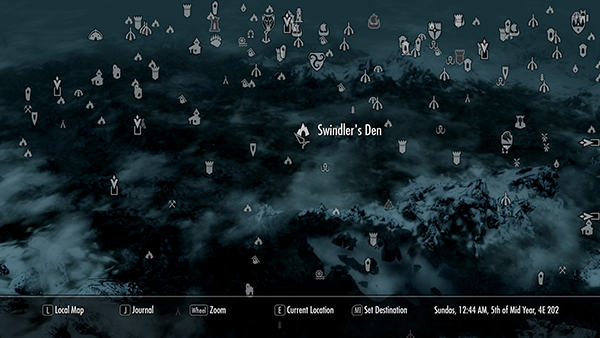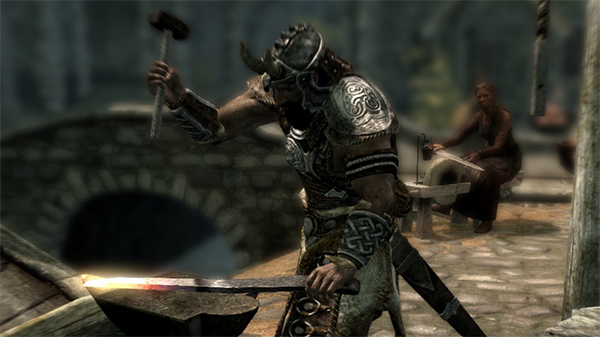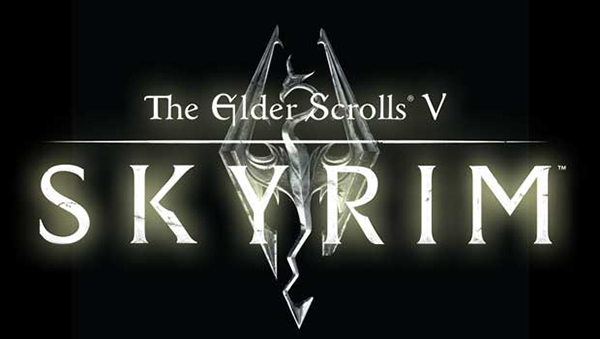Dragons are cool. Sure, maybe they’ve been the basis for a few too many future fantasy romance novels, but they remain cool nonetheless. Dragons capture that same part of our imagination that makes dinosaurs so enrapturing. They’re these huge, powerful, alien-seeming creatures that make humans, accustomed to being the dominant form of life, feel small, weak, and powerless. Dragons appeal to some primal part of us that takes us back to when our ancestors huddled around the fire at the mouth of the cave and wondered what strange and dangerous creatures lurked out in the dark.
Dragons are not what make Skyrim my pick for Game of the Year.
The reason Skyrim is my game of the year is that it doesn’t have to be a game about dragons. Skyrim can be a game about a young mage who joins and works his way up through the College of Winterhold, it can be about a warrior who joins the Companions in an attempt to bring honor back to the land, it can be about a soldier who gets caught up in a huge struggle between rebels and the empire they’re fighting against, or, yes, it can be about the return of dragons to the world and the Dragonborn’s quest to discover why. Skyrim can be a game about any of those things or all of those things, or a whole host of other things I didn’t list.
Plenty of games today use the idea of choice to draw the player in, but none embrace it with the same enthusiasm as Skyrim. It hasn’t just given the player a few superficial options here and there and said, “Oooh, look how much freedom you have!”, it has take the concept of player choice and integrated it into its most core mechanics; Skyrim has eaten choice’s heart to gain its power.
Look at the list above again. Each of the paths I mentioned has a chain of quests that is just as engaging and intricately-designed as the “main” quest; each one could provide the central plot of any other game. What other game allows the player to define the core story arc with such freedom? Mass Effect is always going to be about a soldier trying to save the galaxy from the Reapers, Dragon Age is always going to be about the sole surviving Grey Warden struggling to stop the Blight, and Fallout: New Vegas is always going to be about the Courier and the multi-faction fight over the Hoover Dam. All those games allow you to affect how events play out, but none of them give you the freedom that Skyrim does to determine the very core of those events. All of those games have generous amounts of side content for the player to explore, but in none of them is the side content so involved that it can legitimately serve as its own central conflict if the player so chooses.
But just allowing the player to decide at a fundamental level what they want their story to be about was not enough for Bethesda. Even if you completely throw out the primary quest chains there’s still a mind-bogglingly huge amount of stuff to do.

To illustrate let’s compare Skyrim to another open world game that recently released, Assassin’s Creed: Revelations. (Yes, I’m aware that comparing these two games is like comparing apples and carbureters, but bear with me.) Revelations took me about 22 hours to play through, start to finish, and while I didn’t do absolutely everything there was I did a pretty good chunk of it. As modern games go 22 hours is a decent length, not super long but not short either. 22 hours into Skyrim and I had barely started the game; I hadn’t even left the initial province, the area surrounding Whiterun. I had only progressed far enough through the main quest to have just found out what being called “Dragonborn” even means. I had joined the Companions, but only just been properly initiated. I was beginning to consider heading off to the College, but hadn’t actually left yet.
So what was I doing? Nothing really, and yet everything. I explored caves and cleared forts of bandits, recovered an artifact for a shop owner and got myself killed by mammoths. I went hunting to collect souls to practice enchanting, and worked on my smithing, creating far, far too many iron daggers in the process (which I then enchanted, of course). I cured a mystical tree of whatever it was that ailed it, and intimidated a local landowner because somebody paid me to. I spent 22 hours almost completely avoiding all the things I listed at the start, all the things that could on their own serve as the primary quest in any other game. And what’s more, it didn’t get tedious; I loved every minute of it, and I’m sure I could spend another several hundred hours continuing to avoid all the major quests if I wanted to.

Skyrim dumps the player into its vast, living world and says, “Enjoy.” It doesn’t railroad the player down the main quest, and it doesn’t punish the player for going off on tangents. When you start a new character you have endless possibilities before you, and are encouraged to explore them. That’s choice that goes beyond dialog options, branching story paths, or even deciding what story to explore. With that kind of near total freedom it would be easy for the player to end up feeling lost and directionless, but Skyrim manages to walk the ever-so-fine line between freeing the player and overwhelming them. It guides but doesn’t force, always giving the player a sea of opportunity without drowning them in it.
Video games allow players to live out fantasies that would be impossible in the real world, but usually they’re prepackaged fantasies created for us. Skyrim allows us to choose between a multitude of fantasies, and partake of as many or as few of them as we want. That freedom is what makes The Elder Scrolls V: Skyrim my choice for Game of the Year.

